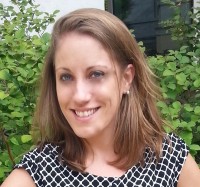This is the final post in a series of interviews conducted by the Woodruff Library with the 2014-2015 Woodruff Library and Emory Center for Digital Scholarship (ECDS) Fellows. Funded by the Laney Graduate School School, the Woodruff Library and Emory Center for Digital Scholarship (ECDS) awards fellowships to advanced graduate students expecting to complete their dissertations by the end of the fellowship period. Fellows are placed within the Woodruff Library and ECDS to work in an area related to their subject specialization or interest, culminating in a formal presentation in the Spring.
An Interview with Jennifer Schaefer
Woodruff: Tell us a little bit about yourself. Where are you from? What’s your favorite book? What’s your favorite thing about Emory/Atlanta? Etc.
Jennifer: Before beginning the PhD at Emory, I lived in Chicago. After a few years of living in Atlanta, I began to appreciate the city’s cultural offerings and performance spaces. At Emory, I feel privileged to be part of an collegial and engaging intellectual community both inside and outside of the Department of History. Beyond my academic life, one of my favorite pastimes at Emory is intramural soccer during the Fall semester. My favorite book is Tres Tristes Tigres (Three Trapped Tigers, in translation) by Guillermo Cabrera Infante. Writing in exile from revolutionary Cuba, Cabrera Infante plays with the limits of language and joyfully engages his readers with literary and historical allusions.
Woodruff: What are you researching for your dissertation?
Jennifer: A series of military dictatorships and authoritarian civilian governments from 1966 to 1983 limited political and cultural participation in Argentina. As police broke up concerts, infiltrated political groups, and occupied universities, young people attempted to fortify their generational identity and recuperate lost autonomy. My dissertation, entitled “Rebel, Martyr, Hero: Authoritarianism and Youth Culture in Argentina, 1966-1983,” analyzes how young people raised their exemplary contemporaries to the status of archetypical rebels, martyrs, and heroes. I argue that young people mobilized the symbolic power of rebels, martyrs, and heroes. Through acts of commemoration and memorialization, they constructed collective memories to perpetuate shared generational identities otherwise threatened by authoritarian practices. Emory University grants including the Woodruff Fellowship, the Conference on Latin American History’s James C. Scobie Award, and a Tinker Field Research Grant supported a cumulative year and a half of research in Argentina.
Woodruff: What interested you about the Woodruff Library Fellowship?
Jennifer: I strongly believe in writing and research as a collaborative endeavor, and in my role as as the Emory Writing Center / Education and Outreach fellow, I am able to facilitate exchange among students, faculty and staff at every stage of this process. I was particularly interested supporting graduate student writing, as well as engaging with undergraduate students beyond the classroom setting.
Woodruff: What will you be working on this year for your Woodruff Library Fellowship?
Jennifer: Because my work is split between the Emory Writing Center and the Woodruff Library, I have the opportunity to tutor undergraduate and graduate students from the humanities, social sciences, and sciences. I also organize workshops like the dissertation “boot camps” through the library and facilitate collaboration between the Woodruff Library and Emory Writing Center faculty, staff, and students.

